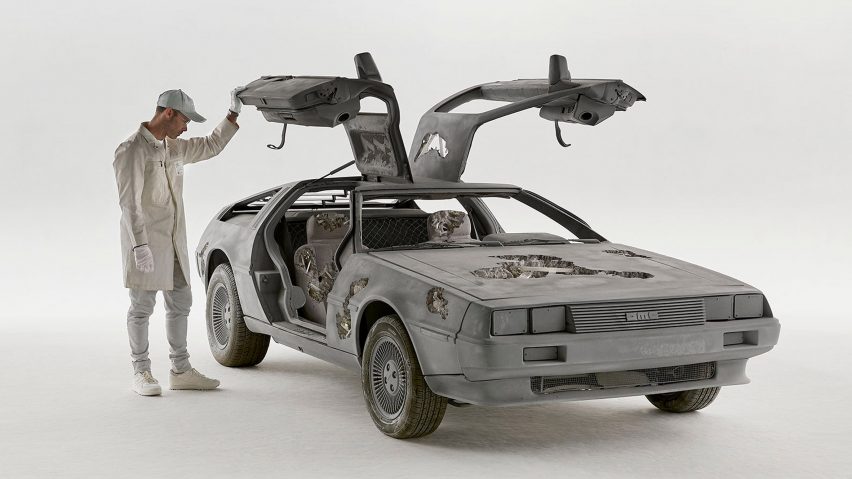American artist and designer Daniel Arsham has crystallised the flying car from Back to the Future, and bagged and bound Mickey Mouse for his latest exhibition, which imagines the world in the next millenium.
The 3018 exhibition opens tomorrow, 8 September 2018, at Galerie Perrotin in Manhattan's Lower East Side.
Following on from Arsham's previous explorations into history through physical objects, the showcase features icons of American pop culture reimagined in a future setting, with forms and materials distorted to suggest decay.
"3018 continues Arsham's dystopian vision of the future, one in which culture as we know it today is eroded, and the objects of modern life have fallen into aestheticised obsolescence," said a statement from the gallery.
"Though the exhibition contains pieces never before seen in New York, visitors will recognise strains of previous works by Arsham, as signature forms and strategies recur, unifying Arsham's involvement in different disciplines – sculpture, architecture, film, performance – into a total oeuvre."
A series of cars installed on the garage-style ground floor of the gallery include the 1981 Delorean, used as the basis for the flying vehicle from the Back to the Future films, and the 1961 Ferrari 250GT California in the movie Ferris Bueller's Day Off.
But Arsham, who also co-founded Brooklyn studio Snarkitecture, has covered the vehicles in crystal to give them an ashy grey appearance, as if they are forgotten artefacts. Huge chunks of the cars are also missing as if they have "eroded away".
Complementing these two new works is an installation called Welcome to the Future. It comprises a pile of junk-yard objects made volcanic ash, pyrite crystal, selenite, and quartz, which Arsham created for the gallery in 2015.
White sculptures made out of white hydrostone plaster are recognisable as cartoon characters – including a figure that resembles Mickey Mouse, a bunny and a teddy bear – covered in bags and bound by rope.
The designs draw on American visual artist Man Ray's The Enigma of Isidore Ducasse, which was created in 1920 and involved a sewing machine covered in a blanket tied in string.
Other toons are cast in hydrostone and quartz as two-dimensional wall hangings, detailed with an outline that resembles embroidery. Each is damaged in some way: one has cracks in the surface, while another appears to be smashed into different pieces.
"The folds in the fabric have hardened in place, resembling the wet drapery technique on an ancient Greek statuary, an effort to capture in stone the diaphanousness of fabric," said the gallery.
The walls of this space also appear to be crumbling away to reveal a broken wooden structure inside. But this effect is created by trompe-l'oeil wallpaper designs that Arsham created with Brooklyn design studio Calico Wallpaper for the exhibition.
Other illusions include a sign spelling "FUTURE" that appears to be pushing its way through one of the walls, leaving draping forms behind. Arsham formed the piece using a mix of plaster, foam and white paint.
Similar eroded and cloth-like wall effects featured in a 2016 exhibition of Arsham's work at Georgia's Savannah College of Art and Design (SCAD) in 2016. The same year, his solo show at Galerie Perrotin included a cave formed from purple spheres.
A retrospective of work by Snarkitecture, which Arsham runs with architects Alex Mustonen and Ben Porto, took place at National Building Museum in Washington DC during summer 2018 summer and included a display of work inside an entirely white house.
The 3018 exhibition runs from 8 September to 21 October 2018 at Galerie Perrotin, 130 Orchard Street, New York.

